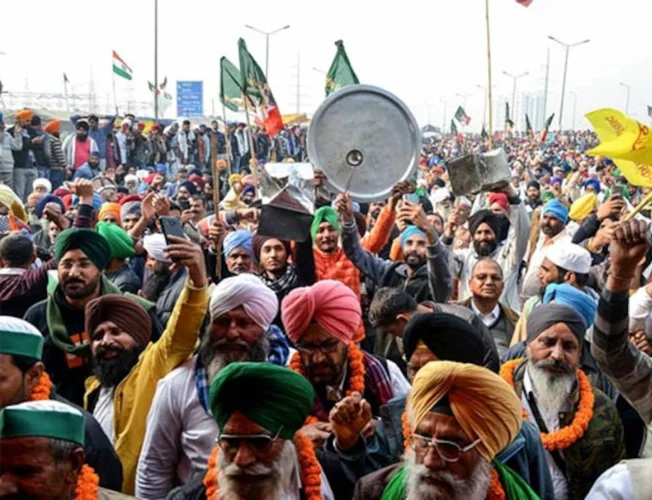On February 26, 2024, farmers across India participated in various protests, raising their voices against concerns related to minimum support price (MSP), WTO policies, and other issues. This article provides a comprehensive overview of the day’s events, capturing the essence of the farmers’ movement and its demands.
Tractor Rallies and Effigy Burnings Mark Nationwide Protests
Farmers belonging to numerous villages across Punjab, Haryana, and western Uttar Pradesh embarked on tractor rallies. These rallies were accompanied by symbolic acts of burning effigies, specifically targeting the World Trade Organization (WTO). This action coincided with the 13th ministerial conference of the WTO held in the United Arab Emirates.
The Samyukta Kisan Morcha (SKM), a coalition of farmer unions leading the 2020-21 farmers’ agitation, called for a ‘Quit WTO Day’ demonstration. Farmers affiliated with SKM parked their tractors along highways in Punjab and Haryana, aiming to raise awareness about their concerns regarding the WTO’s impact on the agricultural sector in India.
Farmers Demand Legal Guarantee for MSP
A key demand of the protesting farmers is a legal guarantee for MSP for agricultural produce. This would ensure a minimum price at which the government would purchase crops from farmers, thereby protecting them from potential exploitation by private companies and market fluctuations.
The Bhartiya Kisan Union (BKU) Tikait and BKU LokShakti, two prominent farmer groups, initiated a journey from Noida towards Delhi to emphasize their demand for an MSP law. This move follows recent protests by the Bhartiya Kisan Parishad and All India Kisan Sabha, further amplifying the farmers’ voices.
Farmer Leaders Plan ‘Tractor Chain’ Protest
Rakesh Tikait, a prominent farmer leader, announced the plan to form a “Tractor Chain” on highways leading to Delhi. This strategy involves parking tractors along specific stretches of highways, particularly divider highways, to showcase solidarity and pressure the government to address their grievances.
Ongoing Efforts to Unite Farmer Groups
While various farmer organizations are participating in protests, attempts to achieve complete unity remain a challenge. The Samyukta Kisan Morcha (SKM), known for leading the 2020-21 protests, established a six-member committee to engage in dialogue with other farmer groups. However, this committee has yet to hold discussions with SKM (Non-Political) and Kisan Mazdoor Morcha, the leading forces behind the ongoing “Delhi Chalo” protest.
Traffic Disruptions and Security Concerns
The ongoing protests have led to traffic disruptions in various regions, particularly near borders connecting Delhi with neighboring states. To manage the situation, the Delhi Police has increased security measures at the Singhu, Ghazipur, and Tikri borders.
Conclusion
The farmers’ protest in India continues to evolve, highlighting pressing concerns related to agricultural policies and economic well-being. While challenges exist in achieving complete unity among various farmer groups, the ongoing demonstrations showcase their unwavering commitment to seeking solutions and advocating for their rights. As the situation unfolds, it remains crucial to monitor developments and engage in constructive dialogue to address the needs of the agricultural community and ensure sustainable growth in the sector.
Read more.. Marketing News, Advertising News, PR and Finance News, Digital News.





